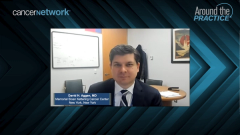
Treatment Strategies for Patients Who Progress on Adjuvant Pembrolizumab
Following the advent of adjuvant pembrolizumab in high-risk renal cell carcinoma, experts consider treatment strategies for patients who progress on adjuvant pembrolizumab.
Episodes in this series

Transcript:
Robert J. Motzer, MD: Two last points. First, for Mehmet. This has opened a whole new line of therapy for patients who are treated with adjuvant pembrolizumab [for renal cell carcinoma] but relapse. What’s your way of thinking about this in terms of recommending other treatments?
Mehmet A. Bilen, MD: Thank you so much, Bob. This is going to affect how we treat our patients and also our clinical trial eligibility and design. The timing of progression and the cyto-progression are important. For example, if someone completed a year of pembrolizumab and has a disease recurrence after another couple of years, I may treat this patient as having no prior line of therapy, with either I/O [immuno-oncology]–I/O or I/O–VEGF. But if progression happens while the patient is on adjuvant pembrolizumab, unless this is an oligoprogression, sometimes we use local therapy, such as SBRT [stereotactic body radiotherapy] or resection. Then I like to bring VEGF on board, especially if this has multiple new spots, like liver metastases and bone metastases. This tells me that there’s some intrinsic I/O resistance, and I want to bring another class of agent on board, either a single-agent TKI [tyrosine kinase inhibitor] or I/O–TKI, which we discussed earlier. We have many of those combinations available, but hopefully, down the road, we’ll get biomarker-driven sequencing trials that will give us more data on what to do and how to do it.
Robert J. Motzer, MD: All right. The last question is for David. Obviously, we’re very much involved in neoadjuvant approaches for bladder cancer. For kidney cancer, is there a role for neoadjuvant therapy or any interest in pursuing it?
David H. Aggen, MD: It’s likely that we’re going to be looking at combination therapies in the neoadjuvant setting in the future. The PROSPER RCC trial, which has completed accrual, is looking at a neoadjuvant and adjuvant PD-1 approach. I’m a little concerned that we’re not going to see dramatic responses with PD-1 monotherapy. There was a phase 2 study out of MSK [Memorial Sloan Kettering Cancer Center in New York, New York]. Maria Carlo is the first author. In 15 patients, the largest reduction in primary tumor with PD-1 neoadjuvant therapy was about 40%. It’s not clear that immune priming in kidney cancer is going to be equivalent in the neoadjuvant setting as it is in other diseases. The future of a neoadjuvant approach is very much up in the air, and we may be treating patients with I/O–TKI up front and very carefully considering cytoreductive nephrectomy in many cases.
Transcript edited for clarity.
Newsletter
Stay up to date on recent advances in the multidisciplinary approach to cancer.










































